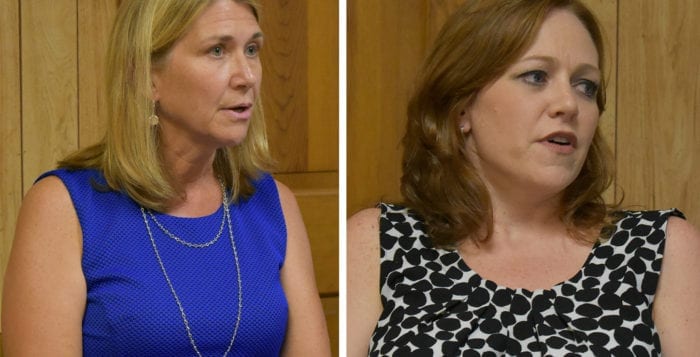By Kyle Barr and Alex Petroski
Political races for local judgeships don’t tend to garner much attention, but the 2018 race to preside over Suffolk County’s Surrogate’s Court is breaking the mold.
Judge John Czygier Jr., who currently oversees the county’s Surrogate’s Court, is nearing the mandatory retirement age, leaving a vacancy candidates Tara Scully and Theresa Whelan are competing to fill. The position, which yields a salary in excess of $200,000, carries a 10-year term, and the occupant may serve until age 70. The candidates face off in the Democratic primary Sept. 13 for the party line in the general election.
The situation has drawn criticism far and wide, largely on the practice of cross-party endorsement deals. The candidates sat down Sept. 6 for an exclusive interview with TBR News Media’s editorial staff to set the record straight.
What is Surrogate’s Court?
Surrogate’s Court is responsible for handling all issues involving wills and the estates of people who die. The court also handles guardianship hearings and some adoption cases for children whose parents are deceased. Each of New York state’s 62 counties has one surrogate judge except New York and Kings counties, which have two each. The court’s rulings can involve large amounts of money, making it uniquely susceptible to political patronage.
Scully and Whelan both said they have the utmost respect for Czygier and seek to continue his legacy and practices.
“Surrogate’s Court is there to help families when they can’t really help themselves,” Whelan said. “It has to be fair.”
Scully stressed the importance of having empathy in Surrogate’s Court.
“It’s a sanctuary and it needs to be treated like that,” she said. “People there are dealing with extremely difficult issues.”
Family Court Judge Whelan vies for nod
“I thought that it was important that an actual Democrat represented the Democratic Party in this race.”
— Theresa Whelan
Whelan, 56, a Wading River resident, said she is throwing her hat into the ring for the Democratic nomination because of her qualifications and experience.
“I have the bench experience,” Whelan, a registered Democrat, said. “I thought that it was important that an actual Democrat represented the Democratic Party in this race.”
The nominee took the bench in Suffolk County Family Court in 2008, before becoming the supervising judge in 2016. There, she hears primarily abuse and neglect cases. Her responsibilities include overseeing nine judges and seven support magistrates in two courthouses.
“I have assisted hundreds, if not thousands of children to be successfully reunited with their parents,” Whelan said. “And if that’s not possible, we try to find them another loving option.”
Since 2009, Whelan has led Suffolk County’s Child Welfare Court Improvement Project, an initiative to address court practices when a child is removed from a parent’s care while trying to ensure their safety and well-being.
The nominee said she is an active member of the Suffolk County Bar Association and often lectures for them. She co-chaired Suffolk’s Family Court & Matrimonial Law committee for three years and is a former president of the Suffolk County Women’s Bar Association. Whelan’s husband, Thomas, is also a judge, currently serving as a Suffolk County Supreme Court justice.
Despite current calls for an end to party patronage, Whelan said the position she’s running for is not a tool to fix the political system. She hopes to win on her own merits.
“I have support of statewide judges, the chief judge, the administrative judge, the bar association, etc. [in my roll on the Family Court],” the nominee said. “I stand here as my own candidate.”
Scully cites her experience in elder law
Scully, 41, of Setauket, said she’s seeking the Democratic nomination after calls by Newsday and other elected officials to challenge the patronage system affecting this and other judicial races.
A registered Republican, she pointed to her years working in elder law as part of the experience she can bring to the Surrogate’s bench.
“I do recognize I have an uphill battle,” Scully said. “But I love the Surrogate’s Court, and I believe the sanctity of our courts has to be preserved.”
Scully started her career working in the executive chamber of former New York State Gov. George Pataki (R), before serving as counsel in guardianship proceedings for the state’s Appellate Division’s Mental Hygiene Legal Service. Like Whelan, she also is a former president of the Suffolk County Women’s Bar Association.
Scully began her Port Jefferson-based practice in 2011 focusing on elder law. She said she has extensive experience in estate planning and administration, asset protection and guardianship proceedings, all of which she said would be important knowledge for Surrogate’s Court. Like Whelan, Scully also has political connections in the family as her father, Peter Scully, has name recognition in Suffolk County. He previously served as the regional chief for the New York State Department of Environmental Conservation and currently works as one of County Executive Steve Bellone’s (D) deputies.
Tara Scully said she often provides free legal representation for indigent seniors, veterans and those with disabilities.
“I have a poor business sense in the amount of pro bono work I take on,” Scully said.
In 2015, Scully ran for Brookhaven Town District Court judge where she said she saw firsthand the way party patronage has entwined itself with politics after turning down a cross-endorsement deal. She lost by 173 votes.
“I was so green I didn’t realize at the point that in many circumstances it was business as usual,” Scully said. “I think a lot of people were upset with me that my gut reaction was revulsion.”
Political backstory
“Cross-endorsement deals are dictating who our judicial choices are, and the voter is unaware an individual without political backing, without a political upbringing or allegiance to political parties is never going to take the bench.”
— Tara Scully
Although judges are expected to set aside their personal beliefs, politics has marred the race, though not necessarily thanks to the candidates themselves. Neither Whelan nor Scully were involved in this race as of early summer. Newsday reported earlier this year District Court Judge Marian Rose Tinari, who is married to Conservative Party chairman, Frank Tinari, and is a Conservative herself, had secured the Democratic Party line in the Surrogate’s Court race as a result of a deal with Suffolk Democratic Party chairman, Rich Schaffer, which was one of many similar deals between Suffolk party bosses.
In June, Newsday ran an editorial in the form of a want ad, calling for a candidate “with a backbone to resist pressure from political bosses,” in response to the cross-endorsement of Tinari. Scully said she sprang into action as a result of the editorial to meet a tight deadline, and garnered enough signatures to run as both a Democrat and Republican. With a primary challenger stepping up to the plate, Tinari withdrew. Democrats then selected Whelan, who called herself a lifelong Democrat, as their candidate.
Scully has argued her decision to enter the Democratic primary — despite being a registered Republican — has provided voters with a more transparent choice than if a Conservative had remained on the Democrat line.
“I think the real point is six weeks ago, eight weeks ago, the Democrat candidate was a Conservative, and Democrats would go in and vote and not have any idea that the individual they’re voting for is not in line with their party philosophies,” Scully said. “Cross-endorsement deals are dictating who our judicial choices are, and the voter is unaware an individual without political backing, without a political upbringing or allegiance to political parties is never going to take the bench.”
Whelan argued that voters are equally in the dark with a Republican in a Democratic primary. If she loses Thursday, there will be one name occupying both major party’s lines come November, as Scully has already been penciled onto the ballot by the Republican Party. Whelan joked when voters enter booths Sept. 13 they’ll simply be deciding between two Irish last names with little knowledge of the politics. She also took issue with Scully portraying herself as “standing up for Democratic principles” on her campaign site.
“If I don’t win the primary, voters don’t have a choice, and I think that’s fair to say,” Whelan said. “I’m presenting myself as a Democratic Party member and the experienced judge, so that Tara and I can actually have a real election on Election Day, and I think that’s what she was trying to accomplish in the beginning.”
This post was updated Sept. 11. This post was updated Sept. 12 to clarify a quote from Whelan.



 Sound Beach resident Bonnie Boeger took this beautiful photo while walking in Rocky Point with her iPhone8 Plus. She writes, “The multicolored coneflowers were all lined up and this little guy was posing for me. Apparently I was talking to him, asking him to move and spread his wings. I love photographing butterflies and plants and as much butterfly- and bee-friendly stuff as possible, but you never know where they will be.”
Sound Beach resident Bonnie Boeger took this beautiful photo while walking in Rocky Point with her iPhone8 Plus. She writes, “The multicolored coneflowers were all lined up and this little guy was posing for me. Apparently I was talking to him, asking him to move and spread his wings. I love photographing butterflies and plants and as much butterfly- and bee-friendly stuff as possible, but you never know where they will be.”


































